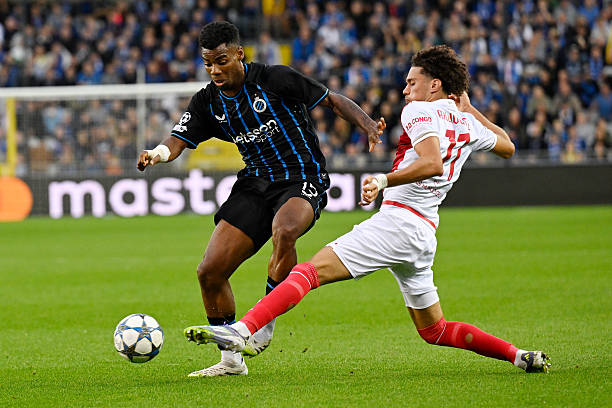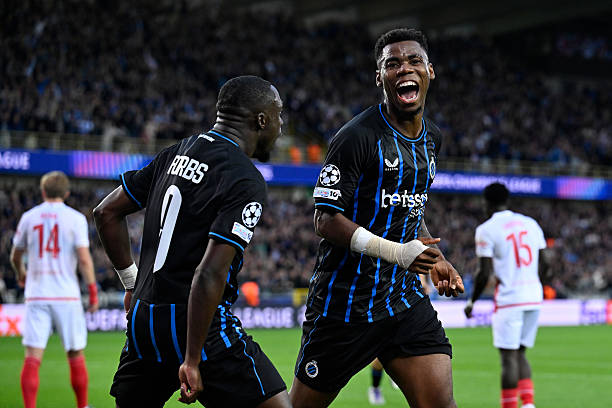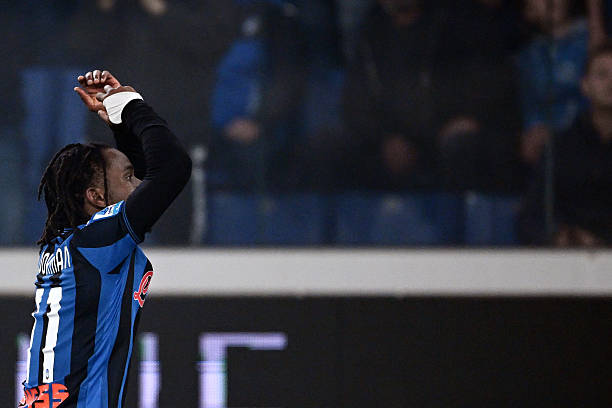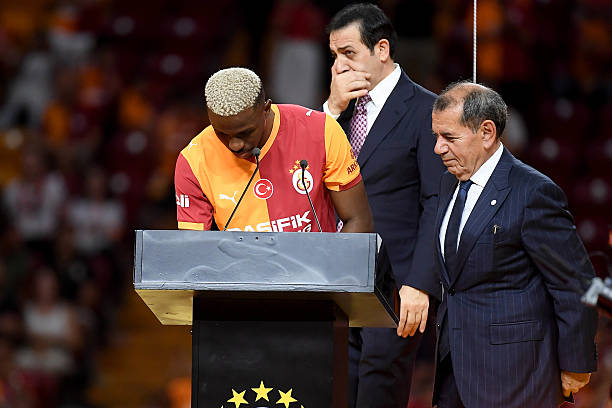The UEFA Champions League may be a European spectacle, but its pulse beats across Africa, and nowhere is it felt more than in Nigeria’s lively viewing centres and living rooms. This week, local football fans had plenty to celebrate as Club Brugge — propelled by an electrifying goal from Super Eagles midfielder Raphael Onyedika — sent a clear message with a resounding 4-1 win over French side Monaco.
The Tuesday night encounter generated major buzz in Lagos, Abuja, Kano and far beyond, especially with Onyedika’s impressive performance. For Nigerian supporters, seeing one of their own step into the continental spotlight and deliver in style reinforces pride in homegrown talent. His goal, a well-taken strike, marked his first of the season and opened the scoring, setting the tone for his club’s campaign.
Onyedika wasn’t the only hero for Brugge on the night. Nicolo Tresoldi, Hans Vanaken, and Mamadou Diakhon also got their names on the scoresheet, each contributing to Monaco’s woes. But it was Onyedika’s display — beyond just finding the net — that stole headlines in Nigeria and across much of West Africa, where football remains a unifying language.

How Onyedika Stood Out: A Star Among Stars
According to official match statistics, the Nigerian midfielder put in a multifaceted display. He completed 45 accurate passes and was particularly effective moving play forward, registering five deliveries into the final third — proof of his ability to connect midfield and attack. He also created one clear-cut chance for his teammates, showing vision and composure under pressure.
Defensively, Onyedika made his presence felt. He recorded two vital blocks that prevented Monaco from threatening Club Brugge’s lead and chipped in with two timely interceptions. Such all-around efforts not only earn plaudits from pundits but also inspire teammates and turn heads back home in Nigeria, where fans and analysts often measure foreign-based Super Eagles by their ability to contribute on both ends of the pitch.
Local Reactions: Pride and Caution
News of Onyedika’s performance dominated football discussions in Nigerian media, with commentators like Lagos-based sports analyst Chuks Nwosu stating, “When you see our boys performing at this level, it proves that Nigeria’s football system, despite its challenges, continues to produce world-class talents.” Similar sentiments echoed across radio talk shows, WhatsApp groups, and social spaces, as fans dissected the match and highlighted Onyedika’s football intelligence and work rate.
In Ghana and neighboring West African nations, the match drew similar attention. Football there, much like in Nigeria, is more than a game—it’s a key part of local identity and pride, especially when a player from the region shines on Europe’s grandest stage.
Substitution Drama: Transparency and Teamwork
Onyedika’s night, however, ended with some frustration. He was substituted in the 81st minute, and broadcast images captured him visibly upset as he exited the pitch. Addressing this, Club Brugge’s head coach Nicky Hayen clarified the situation after the match, explaining that Onyedika had communicated some discomfort, prompting the staff to act with caution—especially since the team had only one substitution left due to an earlier injury.
“There was a bit of miscommunication about it. I want to be quick about it because we’re not just eleven, but 20 or 25 players,” Hayen explained in his post-match remarks. Such transparency is often rare in big European clubs, but Brugge’s communication helps put fans at ease and keeps speculation to a minimum—a lesson domestic teams could learn from.
Coach’s Perspective: Ruthless Attack and Team Spirit
Coach Hayen was full of praise for his side’s approach, reflecting on a dominant first half that laid the groundwork for victory. “We played well between the lines and especially exploited the space behind their defense, which resulted in a lot of chances,” he observed. The coach’s emphasis on tactical flexibility and squad depth speaks to the European game’s continual evolution. Nigerian and African coaches keen on exporting talent and importing tactical knowledge often look to such examples for inspiration.
Hayen did, however, express some regret that the margin of victory wasn’t even greater. “The only downside might be that the score should have been much higher, but of course, we are very happy with this result. We know that goal difference can also be important, so in that respect, this is an excellent start,” he added. This forward-thinking mentality aligns with the competitive spirit so prevalent in African leagues, where every point and goal margin can determine continental qualification or survival.
Consistency: Lessons from Setbacks
Reflecting on recent fixtures, Hayen referenced the team’s struggles just days before against La Louvière, using it as a lesson to reinforce the value of consistency. “It was night and day compared to Saturday. The energy and passion of our captain were an example for everyone leading by example. The way he played was of the highest class. But of course, we hope for that every game, and not just today. And that applies not only to Hans but to the whole team,” he stated.
Comparisons were drawn to previous campaigns in Europe, including big matches versus Rangers and Atalanta where Brugge impressed but later lost momentum domestically. The message here is clear—a single outstanding European result must be followed up by steady, reliable performances in the domestic league if the team is to maintain serious ambitions.
Nigerian Players Abroad: Raising the Bar
Onyedika’s rise in Belgium is symbolic of a broader trend: more Nigerian footballers are making their mark in top European competitions. According to reports by the Nigeria Football Federation, more than 50 players from Nigeria feature in first-division leagues across Europe. Players like Victor Osimhen, Taiwo Awoniyi, and Moses Simon have all earned transfer moves and powerful league performances based on their exploits abroad. Onyedika’s Champions League display further brightens the spotlight on the next generation of Nigerian superstars.
For local academies and the Nigeria Professional Football League (NPFL), such achievements are double-edged: while fans relish seeing their stars abroad, there’s ongoing debate about how to retain and develop more talent within the local game. More structured pathways and youth support, as highlighted by experts like former Super Eagles captain Segun Odegbami, are essential if local clubs are to reap greater returns from their developmental investments.
What’s Next for Club Brugge — and African Stars?
Club Brugge’s campaign continues, with the next test coming against Sint-Truidense V.V. in the Belgian Pro League. Nigerian fans will no doubt keep a keen eye on Onyedika’s fitness and form as he balances continental and domestic duties.
With the new Champions League season underway, African stars, particularly Nigerians, will be under the microscope — from Cairo to Accra, Lagos to Paris. The pride, debates and high expectations are already fueling spirited debates in Nigeria’s football-loving communities.
As the football season heats up, one thing is clear: the contributions of West African players are more vital than ever to their European clubs, not just as goal-scorers but as total footballers whose skills, resilience, and stories continue to inspire back home.
How do you think Nigerian talent abroad can best be developed and supported — and who are you backing as the standout African star this Champions League season? Drop your views in the comment section and join our passionate community for football discussion, news, and updates!









